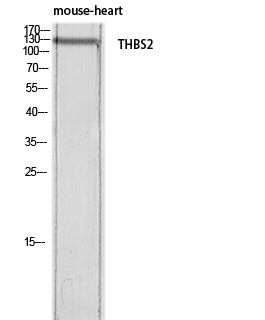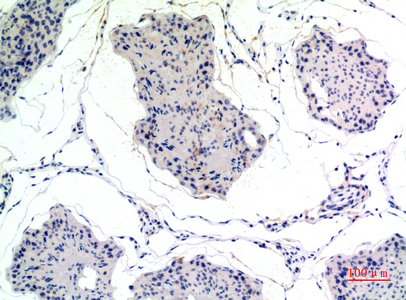

| WB | 咨询技术 | Human,Mouse,Rat |
| IF | 咨询技术 | Human,Mouse,Rat |
| IHC | 1/50-1/100 | Human,Mouse,Rat |
| ICC | 技术咨询 | Human,Mouse,Rat |
| FCM | 咨询技术 | Human,Mouse,Rat |
| Elisa | 1/10000 | Human,Mouse,Rat |
| Aliases | THBS2; TSP2; Thrombospondin-2 |
| Entrez GeneID | 7058 |
| WB Predicted band size | Calculated MW: 130 kDa; Observed MW: 130 kDa |
| Host/Isotype | Rabbit IgG |
| Antibody Type | Primary antibody |
| Storage | Store at 4°C short term. Aliquot and store at -20°C long term. Avoid freeze/thaw cycles. |
| Species Reactivity | Human,Mouse,Rat |
| Immunogen | The antiserum was produced against synthesized peptide derived from the C-terminal region of human THBS2. AA range:1000-1050 |
| Formulation | Purified antibody in PBS with 0.05% sodium azide,0.5%BSA and 50% glycerol. |
+ +
以下是关于Thrombospondin 2(THBS2)抗体的3篇参考文献及其简要摘要:
1. **"Thrombospondin-2 modulates extracellular matrix remodeling during physiological angiogenesis"**
- **作者**: Bornstein, P., et al.
- **摘要**: 该研究利用THBS2特异性抗体,揭示了THBS2在血管生成过程中通过调节基质金属蛋白酶(MMP)活性影响细胞外基质重塑,抑制过度血管化的机制。
2. **"Antibody blockade of thrombospondin-2 reduces fibrosis and improves cardiac function in a murine myocardial infarction model"**
- **作者**: Frangogiannis, N.G., et al.
- **摘要**: 通过THBS2中和抗体干预小鼠心肌梗死模型,研究发现抑制THBS2可显著减轻心脏纤维化,改善心室功能,表明其作为治疗心脏重塑的潜在靶点。
3. **"Thrombospondin-2 as a biomarker for tumor stroma and poor prognosis in colorectal cancer"**
- **作者**: Yee, K.O., et al.
- **摘要**: 该文献使用THBS2抗体进行免疫组化分析,发现THBS2在结直肠癌间质中高表达,与肿瘤侵袭性和患者生存率降低相关,提示其作为预后标志物的价值。
4. **"Targeting thrombospondin-2 in pancreatic cancer-associated fibroblasts inhibits tumor growth and metastasis"**
- **作者**: Özdemir, B.C., et al.
- **摘要**: 研究通过THBS2抗体阻断肿瘤微环境中癌相关成纤维细胞(CAFs)分泌的THBS2.显著抑制胰腺癌小鼠模型的肿瘤生长和转移,揭示了其治疗潜力。
以上研究均涉及THBS2抗体的实验应用,涵盖心血管疾病、肿瘤微环境及预后评估等领域。
Thrombospondin 2 (THBS2) is a multifunctional extracellular matrix glycoprotein involved in cell adhesion, migration, and tissue remodeling. It belongs to the thrombospondin family, characterized by conserved domains including N-terminal, type 1 repeats, and a C-terminal region. THBS2 regulates cellular interactions by binding to integrins, growth factors, and matrix components, playing roles in angiogenesis inhibition, TGF-β activation, and inflammatory responses. Its expression is associated with tissue repair, fibrosis, and tumor progression, making it a focus in cancer and cardiovascular research.
Antibodies targeting THBS2 are essential tools for studying its expression, localization, and function. These antibodies are typically developed using immunogenic peptides or recombinant proteins corresponding to specific epitopes of THBS2. They are widely used in techniques like Western blotting, immunohistochemistry (IHC), and ELISA to quantify THBS2 levels in biological samples. Validation includes testing for specificity via knockout controls or siRNA silencing. In research, THBS2 antibodies help elucidate its role in pathological processes, such as modulating tumor microenvironment stiffness, promoting metastasis, or suppressing angiogenesis. Variations in antibody clones (e.g., polyclonal vs. monoclonal) may affect sensitivity and epitope recognition, necessitating careful selection for experimental designs. Recent studies also explore THBS2 as a potential biomarker or therapeutic target, driving demand for reliable antibody reagents.
×